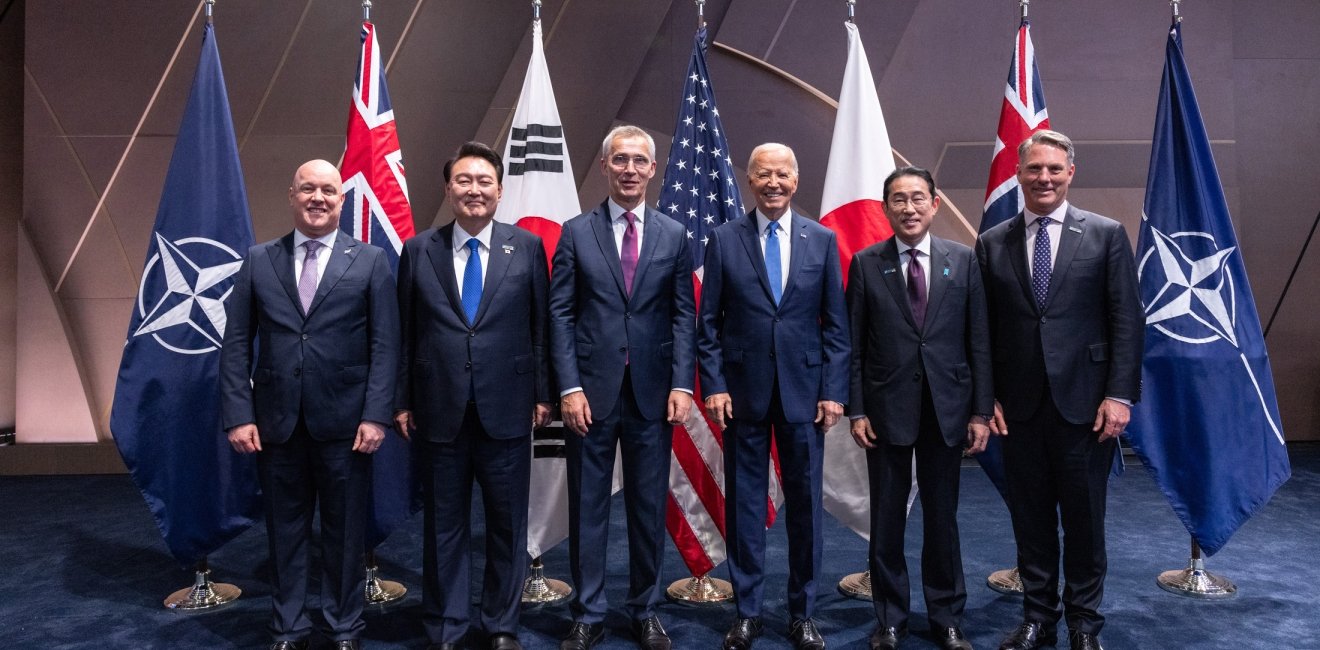In its communique concluding the latest annual summit in Washington, NATO made clear that China was jeopardizing global stability. The acknowledgement by the 32 member countries of the North Atlantic alliance not only has expanded the geographic scope of interest by the organization, but also greater impetus for non-members to continue to support NATO. Yet how greater alignment between NATO and key Indo-Pacific nations in addressing challenges to regional stability outside of NATO’s boundaries translates into action remains in question.
The genesis for Japan, South Korea, Australia, and New Zealand to participate in the NATO summit meetings for the third consecutive year in the row is of course a direct result of Russia’s invasion of Ukraine in 2022, rather than deep-rooted concerns about the China challenge. Since the war in Ukraine, all four countries have stood together with NATO in their opposition against Russian aggression and have made sizable contributions in defense of Ukraine. Each of the IP4 countries have also signed Individually Tailored Partnership Programs (ITPP) with NATO to identify areas of mutual bilateral interest for potential cooperation. For Japan, which has developed strong working relations with NATO since the early 1990s, shared future interests include maritime security as well as cyber defense. At the same time, Tokyo has committed nearly $12 billion in financial assistance to Ukraine’s war effort and has also adapted its export control legislation to provide support. For South Korea, areas for cooperation with NATO focus on arms control, non-proliferation, and counter-terrorism as well as cyber defense with an eye towards addressing the threat posed by the DPRK. The Republic of Korea has also emerged as a major exporter of military equipment since the Ukraine invasion and is expected to further its standing in the global defense industry. Meanwhile, Australia and New Zealand share a common interest in developing interoperability as well as technology cooperation with NATO, while both have also played key roles in training as well as providing technical support to Ukrainians.
In short, the IP4 nations have been critical partners in collective efforts to support Ukraine, and are united in their commitment to push back against Russian aggression. Moreover, as NATO publicly declared that China is “a decisive enabler of Russia’s war against Ukraine,” the alliance has made clear that Beijing’s actions threaten not only the Indo-Pacific, but global order more broadly. But whilst the Indo-Pacific’s security risks are no longer seen as being contained within the region, just how and whether NATO has the capability or indeed the political will to press ahead with decisive actions.
Certainly, NATO’s own mandate not only prevents the alliance from engaging in the Indo-Pacific, but Article 6 states that an attack on land, forces, vessels, or aircraft north of the Tropic of Cancer would trigger collective defensive action. That means not even Hawaii comes under the auspices of protection from Article 5, even though it is a US state. Meanwhile, there is opposition amongst NATO member countries to take on a decisive political stance against China as seen by France’s opposition to the establishment of a liaison office in Tokyo last year even though such a move could have been an effective deterrence mechanism against Beijing taking hostile actions in the region.
There is undoubtedly greater alignment not only of interests, but also a worldview between NATO and the IP4. While NATO’s political as well as legal constraints will prevent any direct engagement in the Indo-Pacific, institutionalizing regular meetings, identifying shared interests, and sharing intelligence are critical building blocks for enhancing trust not only between the IP4 and NATO, but between Japan, South Korea, Australia, and New Zealand themselves.
Author


Global Europe Program
The Global Europe Program is focused on Europe’s capabilities, and how it engages on critical global issues. We investigate European approaches to critical global issues. We examine Europe’s relations with Russia and Eurasia, China and the Indo-Pacific, the Middle East and Africa. Our initiatives include “Ukraine in Europe”—an examination of what it will take to make Ukraine’s European future a reality. But we also examine the role of NATO, the European Union and the OSCE, Europe’s energy security, transatlantic trade disputes, and challenges to democracy. The Global Europe Program’s staff, scholars-in-residence, and Global Fellows participate in seminars, policy study groups, and international conferences to provide analytical recommendations to policy makers and the media. Read more


Indo-Pacific Program
The Indo-Pacific Program promotes policy debate and intellectual discussions on US interests in the Asia-Pacific as well as political, economic, security, and social issues relating to the world’s most populous and economically dynamic region. Read more

Explore More
Browse Insights & Analysis
The OSCE is a Good Value for America



